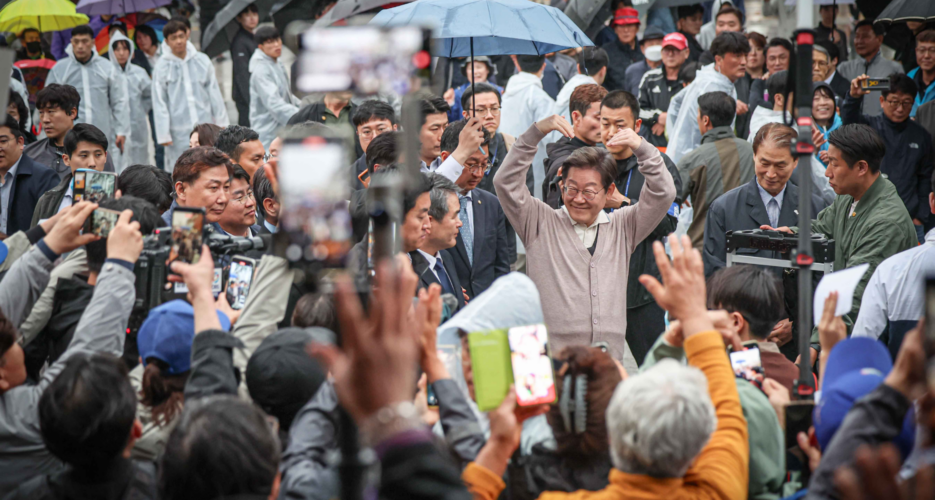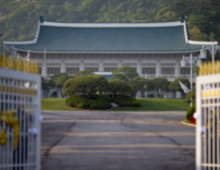|
Analysis Lee Jae-myung begins presidency with unmatched power but high expectationsWith control of the legislature and early public support, Lee faces steep political risks if reforms falter early John LeeJune 16, 2025  Then-Democratic Party candidate Lee Jae-myung meets with his supporters, May 9, 2025 | Image: Democratic Party of Korea Lee Jae-myung begins his presidency with a 58.6% approval rating and majority control of the National Assembly, which offer significant opportunities for him to govern with minimal resistance. But the popular support he currently enjoys appears to stem in large part to the unpopularity of his impeached predecessor and is likely to fade sooner rather than later. This situation sharpens the risks of underperformance and puts pressure on Lee to act fast to make the most of his political momentum, which could dissipate quickly with any missteps during what amounts to a probationary period. POLITICAL CAPITAL BASE Lee enters office under favorable political conditions. His Democratic Party (DP) will hold a legislative majority through 2028, allowing his administration to introduce and pass bills with minimal parliamentary obstruction. Key early appointments, including national security officials from the Roh Moo-hyun administration and a prime minister-designate with legislative experience, indicate an effort to balance technocratic management with political loyalty. This level of institutional control is rare in South Korean politics, where divided governments or weak party discipline have often stalled reforms. While Lee’s approval rating is lower than some past presidents at the same stage, including Moon Jae-in and Lee Myung-bak, the combination of public support and legislative control creates a unique policy window. The central risk Lee faces is maintaining cohesion, discipline and delivery within the ruling party and executive branch.  Wi Sung-lac with Lee Jae-myung just after nullifying Yoon Suk-yeol’s martial law attempt on Dec. 4, 2024 | Image: Wi Sung-lac via Facebook ORIGINS OF POPULAR SUPPORT That Lee enjoys such popularity even though he hasn’t been in office long enough for voters to feel the effects of his policies suggests that his support is shaped by the fallout of the constitutional crisis that ended Yoon Suk-yeol’s presidency rather than direct endorsement of his own policy platform. Lee has leaned into this framework, with the presidential office framing its mandate in terms of “ending insurrection” and “restoring democracy,” highlighting the symbolic and institutional reset his administration represents. Moreover, Lee has reinforced this framing through visible, symbolic gestures, including visits to the Itaewon crowd crush memorial and holding meetings with the National Assembly’s janitorial staff. These moves underscore a deliberate shift from the isolation that characterized his predecessor’s leadership. However, emotion-based approval is inherently volatile, and as the memory of Yoon’s constitutional crisis fades, public sentiment is likely to shift toward performance-based evaluations. EARLY POLICY SIGNALS The administration has taken several immediate steps to establish operational direction. Lee issued his first executive order to form an emergency economic response team and initiated preparations for a supplementary budget. He also launched a 55-member State Affairs Planning Advisory Committee to identify 100 core policy tasks, drawing heavily from his campaign pledges. On the personnel front, Lee appointed a senior AI policy adviser from the private sector to advance a $73.5 billion (100 trillion won) investment pledge, signaling a focus on industrial transformation. In foreign affairs, his phone calls with the leaders of the U.S., Japan and China have emphasized continuity in South Korea’s diplomacy. Meanwhile, his response to balloon launches by South Korean activists into North Korea, which reflects a deliberate move to deescalate tensions with the DPRK, suggests a risk-management approach to national security. These actions indicate a clear preference for early narrative control and policy visibility. But the administration has yet to detail its medium-term fiscal strategy, especially as it seeks to fund new social programs while avoiding inflationary pressure. The absence of clarity on revenue sources could emerge as a key vulnerability.  South Korean President Lee Jae-myung attends a briefing, June 12, 2025 | Image: Lee Jae-myung via Facebook RISKS TO MOMENTUM The resignation of senior civil affairs secretary Oh Gwang-su over real estate speculation and hiding real estate assets under a friend’s name to evade disclosure illustrates how personnel missteps can erode credibility quickly. The position is responsible for internal vetting and legal oversight, making the episode especially damaging. Though Lee responded swiftly, the incident exposed the fragility of institutional trust at a critical early juncture. Other risks are embedded in the administration’s decision to allow the public to nominate ministerial candidates. While the move may broaden his populist appeal, it also increases the risks of increased coordination failures or vetting controversies. If appointments appear politically motivated or lack administrative experience, the system could backfire. Policy sequencing also presents a challenge. Reforms across housing, labor and the tax administration will require both bureaucratic continuity and legislative discipline. However, even with a cooperative National Assembly, intra-party divergence or slow-moving agencies could limit delivery. SUSTAINABILITY TEST AHEAD South Korean presidents often experience sharp declines in popularity after the first year in office. For instance, Moon Jae-in’s approval fell amid housing policy backlash while Park Geun-hye’s dropped following the Sewol ferry disaster. In both cases, the key driver of these reversals is the failure to meet voters’ expectations around economic fairness, corruption control and bureaucratic reform. In Lee’s case, the alignment of institutional power and public expectations heightens this risk. With the main opposition People Power Party still reeling from losing the presidential election, there is no rival party to deflect blame, and no credible external force impeding his agenda. As a result, any policy shortfall or ethical lapse is likely to be interpreted as a failure of Lee’s leadership. Media cycles, interest rate volatility and household debt pressures add significant unpredictability. A single event, whether economic, political or a black swan, can shift perceptions quickly. While Lee and the DP have sought to portray his strong early approval numbers as a political mandate, it is likely more accurate to describe it as the start of his probationary period.  Then-Democratic Party leader Lee Jae-myung during a stock market revitalization task force meeting at the Korea Exchange in Seoul, Nov. 28, 2024 | Image: Democratic Party of Korea IMPLICATIONS FOR STAKEHOLDERS Lee’s political leverage may allow for rapid implementation of regulatory reforms, industrial strategy and social welfare expansion. For businesses and investors, this means less policy uncertainty but also faster exposure to risks from untested frameworks, such as AI governance or public nominations. Ministries may see changes in oversight structures or budget allocations as Lee consolidates executive control. Meanwhile, foreign governments engaging with South Korea should expect continuity but also more assertive messaging on trade, industrial policy and strategic autonomy. Lee’s administration is expected to revisit regulatory proposals that will affect digital platforms, labor rights and capital flows. How effectively the government can operationalize these ambitions without triggering political backlash or economic distortion will shape the next phase of South Korean governance. The administration’s performance in the next 100 days will be critical in determining whether its current political advantage translates into durable institutional change. The political window is open for Lee to implement his platform at scale. But sustained momentum will depend on strategic discipline, institutional coherence and clear risk management. It remains to be seen if the administration will be able to maintain its momentum in the weeks and months ahead. Edited by Alannah Hill Lee Jae-myung begins his presidency with a 58.6% approval rating and majority control of the National Assembly, which offer significant opportunities for him to govern with minimal resistance. But the popular support he currently enjoys appears to stem in large part to the unpopularity of his impeached predecessor and is likely to fade sooner rather than later. Get your
|
|
Analysis Lee Jae-myung begins presidency with unmatched power but high expectationsWith control of the legislature and early public support, Lee faces steep political risks if reforms falter early  Lee Jae-myung begins his presidency with a 58.6% approval rating and majority control of the National Assembly, which offer significant opportunities for him to govern with minimal resistance. But the popular support he currently enjoys appears to stem in large part to the unpopularity of his impeached predecessor and is likely to fade sooner rather than later. © Korea Risk Group. All rights reserved. |











